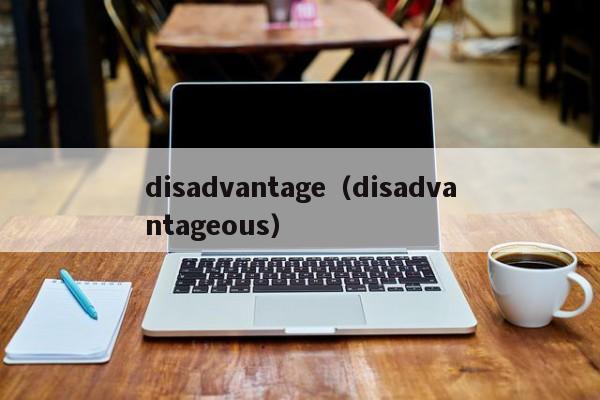今天给各位分享disadvantage的知识,其中也会对disadvantageous进行解释,如果能碰巧解决你现在面临的问题,别忘了关注本站,现在开始吧!
本文目录一览:
谁知道利大于弊的英文翻译
利大于弊:The advantages overweigh the disadvantages.
advantage 英[ədˈvɑ:ntɪdʒ] 美[ədˈvæntɪdʒ]
n. 有利条件; 益处; 优越(性); 处于支配地位;
vt. 有利于; 有益于; 促进; 使处于有利地位;
vi. 得益,获利;
1、最后,你告诉他可能利大于弊。
In the end, you might do more harm than good by telling him.
扩展资料
反义词disadvantage表示不利的。
英 [ˌdɪsədˈvɑ:ntɪdʒ] 美 [ˌdɪsədˈvæntɪdʒ]
n.不利,劣势,短处;损失
1、It will be to our mutual disadvantage.
那将对我们双方都不利。
2、The kernel of that message was that peace must not be a source of advantage or disadvantage for anyone.
那一信息的核心是和平绝不应该成为对任何人有利或不利的根源。
disadvantage&fault 有什么区别?谢谢
disadvantage
n.不利,
不利条件,
缺点,
劣势
其反义词为advantage
fault
n.过错,
缺点,
故障,
毛病
vt.挑剔
vi.弄错
其意思相当于mistake
disadvantage和fault的区别在于:
disadvantage指客观上的,非人为的。
而fault多指主观的,人为的。如:It's
my
fault.这是我的错。

缺点用英语怎么说
缺点用英语是shortcoming或defect或weakness。
详细解释:
shortcoming 英[ˈʃɔ:tkʌmɪŋ] 美[ˈʃɔ:rtkʌmɪŋ]
n. 短处,缺点;
[例句]Marriages usually break down as a result of the shortcomings of both partners
婚姻常因为配偶双方的缺点而破裂。
defect 英[ˈdi:fekt] 美[ˈdiˌfɛkt, dɪˈfɛkt]
n. 瑕疵,毛病; 欠缺,缺点;
vi. 叛逃; 背叛;
[例句]He was born with a hearing defect.
他患有先天性听力缺损。
weakness 英[ˈwi:knəs] 美[ˈwiknɪs]
n. 弱点,缺点; 软弱,优柔寡断; 弱,衰弱,虚弱; 〈口〉偏爱,癖好;
[例句]Stephen himself had a weakness for cats
史蒂芬本人偏爱猫。
shortcoming和disadvantage的区别
shortcoming和disadvantage的区别是:意思不同、用法不同、侧重点不同
一、意思不同
1、shortcoming的意思是:缺点;短处
例句:
His book has its shortcomings.
他的书有其自身的缺点。
2、disadvantage的意思是:不利因素; 障碍;不便之处;损害;损失
例句:
The situation put us at a serious disadvantage.
形势使我们处于非常不利的地位。
二、用法不同
1、shortcoming:用作名词,通常用复数。
2、disadvantage:既可以用作名词,也可以用作动词,意为“使处于不利地位,使不利,使受损,使吃亏”等意思。
三、侧重点不同
1、shortcoming侧重于指某人或某事物所存在的不足或缺陷。
2、disadvantage侧重于指引起问题、妨碍某人或某事成功或发挥作用的因素。
defect 和 disadvantage 的区别
defect 一般指比较客观的 过失 缺点
例如 birth defect 天生的缺陷 如出生就有的毛病
或者物品上的缺陷等
disadvantage 主要指不利因素 劣势 (比较而言的意味较重)
两个的意义上的区别就是 defect 倾向于 对具体的显而易见的缺陷
而 disadvantage 就是比较抽象意义上的 比较意义上的 劣势 不利因素
disadvantage和shortcoming的区别
disadvantage和shortcoming的区别:一、意思不同。二、用法不同。三、侧重点不同。
一、意思不同。
1、disadvantage:不利因素,障碍,不便之处。
2、shortcoming:缺点,短处。
二、用法不同。
1、disadvantage:作名词,障碍。
例句:Itwillbetoourmutualdisadvantage.
翻译:那将对我们双方都不利。
2、shortcoming:作名词,缺点。
例句:Thisisashortcomingofoureducationsystem.
翻译:这是教育制度的缺点。
三、侧重点不同。
1、disadvantage:侧重于对主题的不利因素,但对其他人或者是有利的。一般指物。
2、shortcoming:侧重于指人的缺点。
关于disadvantage和disadvantageous的介绍到此就结束了,不知道你从中找到你需要的信息了吗 ?如果你还想了解更多这方面的信息,记得收藏关注本站。